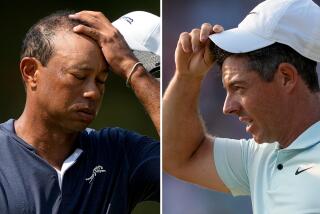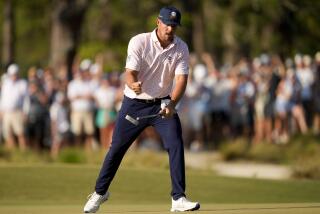Tiger Eyes 1st Double Since 1972
- Share via
From the very beginning, Tiger Woods has done the improbable. A victory in the U.S. Open would be a huge step toward the impossible--the Grand Slam.
Since the first Masters in 1934, the winner has gone on to take the U.S. Open only five times, and not since Jack Nicklaus 25 years ago.
Only Ben Hogan in 1953 added a British Open title. He then skipped the PGA Championship because his badly battered legs from a 1949 car crash made walking the more than 150 holes of match play impossible.
No one has ever pulled off the professional Grand Slam--winning the Masters, U.S. and Britsh Opens and PGA in the same year.
But Woods brings a thrilling sense that anything is possible.
“We’ve got a guy out there who has decided he wants to dominate the game,” Nicklaus said. “Whether he can do it, we’ll have to wait and see.”
Woods has displayed that burning desire to be the best time and again.
He came back from a 6-down to win his first U.S. Amateur and was the first person to win the Amateur three consecutive times. His first PGA Tour victory came in only his fifth start.
In his first Masters as a pro, Woods won by an astonishing 12 strokes, the largest victory margin in a major championship since the 1862 British Open.
And on top of improbable achievement comes the compelling self-confidence, an almost arrogant belief that he can do the impossible.
“I expect myself to win every tournament,” Woods said. “That’s just my mind-set.”
That mind-set has offended some players and mystified others, but it will be key to the complete game needed to win the Open at the Congressional Country Club in Bethesda, Md., starting Thursday.
And that mental toughness is part of the reason--along with the best physical skills ever brought to the game--why winning the Grand Slam is not out of the question for Woods.
“You know, whether it’s realistic or not I couldn’t really tell you,” Woods said. “But I think it can be done. Phil Mickelson last year won four times. Well, if you win the right tournaments four times, then you have the Slam.”
And Woods has an amazing ability to do the right thing at the right time.
Congressional should favor Woods. At 7,213 yards and only par 70, it is the longest in a major championship. Woods hits the ball farther than anyone and even when he needs accuracy his 275-yard 2-iron will leave a shorter approach shot than anyone else.
“He can use his length to an advantage at Congressional,” Tom Watson said. “That can distance him from the rest of the field.”
The Open has a special set of demands--narrow fairways, deep rough and fast greens. But at Augusta, Woods erased any doubts that length was the only strong part of his game.
“The incredible thing about the Masters,” Watson said, shaking his head in disbelief, “is that he never three-putted once in 72 holes.”
Augusta National has generous fairways and no rough. The strategy involves the tricky greens, putting enormous pressure on the short game.
The strategy at the Open starts with the tee shot and never lets up.
“The U.S. Open just brings a different number of pressures and influences on your game that you didn’t realize were there,” defending champion Steve Jones said.
“I was nervous eating breakfast. I was nervous eating lunch. I was nervous going to bed at night. I was nervous at 3 in the morning.”
There also will be pressure from the competition.
Nick Faldo said adding a U.S. Open to his three Masters and three British Opens was his top priority. Greg Norman has never won a major championship in the United States but showed his old form at the Memorial Tournament, shooting a final round 64 to tie for second.
Tom Lehman, second after a bogey on the final hole of last year’s Open, has failed to follow his British Open victory with a dominating year, mostly because of poor putting.
Davis Love III has just recently showed signs of recovering from his three putts from 12 feet on the final hole of the Open last year when he tied with Lehman for a disappointing second.
Colin Montgomerie, Phil Mickelson and Mark O’Meara, along with Love, are probably the best players in the world looking for their first major title.
Jim Furyk, Frank Nobilo, Brad Faxon, Paul Stankowski, Ernie Els and Vijay Singh are also players to fear.
Woods comes into the Open off a 67th-place finish at the Memorial, his worst in 18 events as a pro. But he also went into the Masters after finishing 31st at the Players Championship, his worst finish of the year at the time.
“I’m just trying to peak at the right times and trying to get my game ready,” Woods explained.
Peaking at the right time is what great players are all about.
Nicklaus won the Masters and U.S. Open in 1972 and finished second in the British Open by one stroke when Lee Trevino chipped in on No. 17 at Muirfield. Arnold Palmer went to the British Open with two majors in hand in 1960 and finished second behind Kel Nagel at St. Andrews in what Palmer calls “the greatest disappointment of my career.”
Hogan pulled off the triple in 1953. In 1951, he won the Masters and the U.S. Open but passed up the British Open. Craig Wood won the first two legs of the Grand Slam in 1941 but there was no British Open that year because of World War II.
“It would be just fantastic if someone could win the Masters and the Open and the PGA and the British Open,” Palmer said. “It would do a lot for the game.”
Nicklaus, who won 18 major professional championships and had the same unshakable self-confidence as Woods, perhaps is in the best position to assess the chances of the Grand Slam.
“Anybody winning all four is a very, very difficult thing,” Nicklaus said. “But it is possible.”
That may be all the chance Woods needs.
(BEGIN TEXT OF INFOBOX / INFOGRAPHIC)
U.S. Open Facts, Figures
Event--97th U.S. Open golf championship.
Dates--Thursday through Sunday.
Site--Congressional Country Club, Bethesda, Md.
Length--7,213 yards.
Par--35-35--70.
Format--72 holes (18 daily) stroke play.
Playoff (if necessary)--18 holes on Monday.
Field--156 (150 pros, 6 amateurs).
Purse--$2.6 million
Winners share--$465,000.
Defending champion--Steve Jones.
TV--Thursday and Friday, noon-2 p.m. (NBC), 8-11 a.m., 2-5 p.m. (ESPN). Saturday and Sunday, 9:30 a.m.-3:30 p.m. (NBC). Monday (if necessary), 9-11 a.m. (ESPN), 11 a.m. to conclusion (NBC).
More to Read
Go beyond the scoreboard
Get the latest on L.A.'s teams in the daily Sports Report newsletter.
You may occasionally receive promotional content from the Los Angeles Times.










